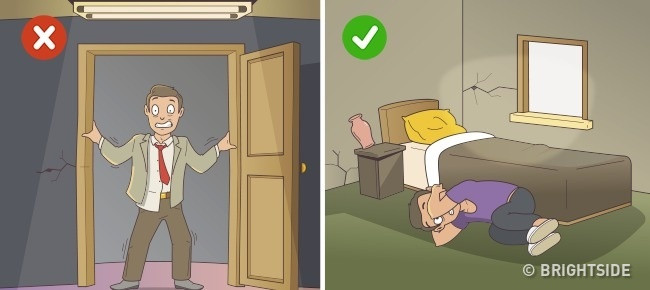How to survive when an earthquake occurs?
Earthquakes often cause very serious consequences. This is a special warning when an earthquake occurs, because not all of us have experience dealing with earthquakes. Even living in a safe area does not mean you will never face this danger. Therefore, equipping survival skills when an earthquake occurs is really necessary for everyone.
Below are recommendations from experts of the Red Cross Association and the United Nations to help you know how to keep yourself safe and respond promptly if an earthquake occurs.

Things not to do
- Do not stand under the door frame . This is a very dangerous mistake because the door frame can fall on your head.
- Do not run outside if you are in a place higher than the ground floor because both elevators and stairs are extremely dangerous when an earthquake occurs.
Lying on the floor, it is better to be close to a long bench or a bed
- If you feel the ground vibrate, immediately move closer to an outside wall because if the building collapses, you will quickly be found.
- Make sure nothing can fall around you, such as lighting fixtures, wall cabinets.
- Lay down on the floor, preferably close to a bench or a bed, noting to be under them! If the wall or ceiling hangs down, the bed will suffer this fall and you will be safe. Also, another effective way is to lie near a wall.
- Curled up, use your arms to hold your head to protect your head.
- Lay down on the floor, preferably close to a bench or a bed and embrace your head to protect your head.
Should we hide under the table?
This hypothesis is quite controversial because the most common danger in an earthquake is falling objects. If you know before the earthquake is not strong enough to cause a collapse, hiding under a table is a safe solution. But in more serious earthquakes, when walls and ceilings fall, a table can crush you!
Is it helpful to run outside?
You will have about 10-20 seconds from the first tremor to the collapse (if any). It's perfect if you take advantage of this time to escape the building. But do not do this if:
- You are higher than the ground floor, as mentioned above.
- There is a crowd in the emergency exit.
- Suspecting the building will collapse in less than 10 seconds should not run out because in this case, the risk of injury when trying to escape is higher than when you are inside.
You need to take the time to assess the situation instead of wondering, hesitating to immediately run out. In an emergency, decision making will become much more difficult.
If you're outside, choose an open space as possible
In this way, the ruins of buildings and wires will not fall on you. If you're on a bridge or staircase, quickly leave them immediately. [15 important survival skills you need to know to save yourself]